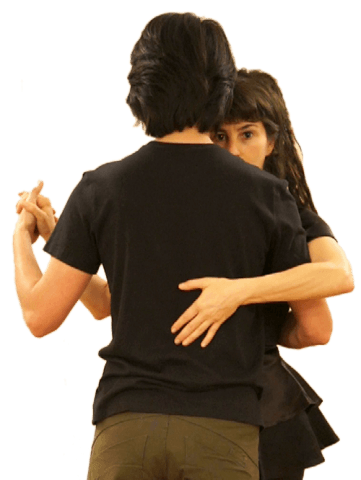
The long-awaited arrival of a word…
This is an update of a post I first wrote in June 2011. I’ve been trying all this time to come up with a better term for following. Today I did it.
I want to tell you the story in full, because I want you to understand what’s gone into it.
The impetus comes from the need to delink gender from lead and follow. But the more I use the term ‘follower’, the more I dislike it. It gives people the wrong idea. It brings out the worst – fear, obedience, and passivity. There are problems with the idea of ‘leading’ as well – he feels too much responsibility to control the outcome.
To solve this problem, I turned, as we often do, to Argentina, for guidance. The most common way that the roles are referred to there are Man and Woman. This is not helpful, but I have to say I prefer those terms to lead and follow. And my own personal tango journey dancing both roles has taken me closer to those terms, not away from them.
I understand gender as a continuum of experiences and performances. I see gender roles as a space of play and self-expression. I see tango as a special place for this play. As a follower I incarnate and play with my femme. As a leader I incarnate and play with my masculinity. Depending on my intentions for the next tanda, I hold my body differently, I move differently, I interact with the people around me differently. I often change my shoes because they impart gendered body sensations and power. When I want to lead, I make the cabeceo as a man… When I want to follow, I flirt. (I never, ever ask a leader to dance. Here’s why. And definitely not with the reverse cabeceo.)
For myself I am very comfortable as a woman leader associating that role with masculinity and its accessories. But I know that my way of relating to the roles is not the experience of many of my fellow Queer Tango dancers. So I have continued to seek a better terminology which delinks the activity of the roles from gender.
A term sometimes used for the lead in Buenos Aires is the verb marcar, to mark. The leader is a marcador. I’ve always liked this term. I imagine that the leader is an artist drawing in the dark. His motions are too small to see. Only the follower manifests his creativity, shines light on it. He marks a plan, a vision. She brings it to life.
in English I can call the leader the Mark.
I tried The Mark and The Light. But the term ‘Light’ seemed burdensome, unintuitive, requiring a stop to translate every time.
I like the idea of the follower as radiance, illumination, brightness, manifestation. But I have struggled to find an appropriate term for her.
In Castellano, the verb ‘to light’ is illuminar, but I find that word sonically cumbersome. So I’ve been searching for something about light. Today I discovered such a beautiful word: revelar. It means to illuminate or reveal, but it means more… to develop. She has responsibility and agency – she brings his idea to life. So a follower is a revelador. In English, I can call her Revel.
I like this, a lot. I want to use a word that reminds us all the time that we are dancing to celebrate and be delighted. Followers can too easily get lost in obedience. We need to constantly remind ourselves to play and sparkle.
Why bother? Names evoke and invoke. Naming the roles, specifying the actions, using words to celebrate and nurture our experience, is part of the process of thriving and being free in this dance.
The Germans have their own set of problems with terminology, using circuitous gerunds to escape the anathematic ‘führer’. In Deutsch, we can easily translate Mark to Künstler, but again, it’s the woman’s role which is so hard to articulate. There is no direct translation of Revel, a revelation which Berliners find profound. The closest thing we’ve found so far which captures her power and her internal delight is Engel, but many Germans do not like the religiosity of this term, and haven’t seen Wim Wenders’ Wings of Desire, so we are still working on a translation and in the meantime, use the English terms.














